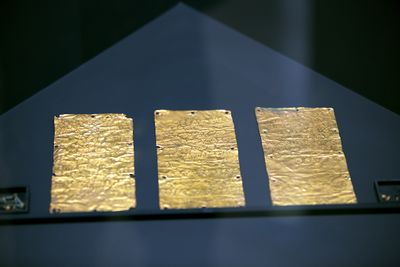
FAIR is a non-profit organization dedicated to providing well-documented answers to criticisms of the doctrine, practice, and history of The Church of Jesus Christ of Latter-day Saints.
| Line 3: | Line 3: | ||
|category=Book of Mormon/Anthropology | |category=Book of Mormon/Anthropology | ||
}} | }} | ||
| − | [[ | + | [[File:Prygi_plates_one.jpg|thumb|400 px|right|Pyrgi gold plates. Photo (C) 2014, William J. Hamblin, used with permission. |
These plates are religious texts dating to around 500 BC in Italy; one is written in Phoenician (= Paleo-Hebrew), and two in Etruscan. They are now in the Etruscan Museum in the Villa Giulia in Rome. The Phoenician text is in the middle. (Click to enlarge)]] | These plates are religious texts dating to around 500 BC in Italy; one is written in Phoenician (= Paleo-Hebrew), and two in Etruscan. They are now in the Etruscan Museum in the Villa Giulia in Rome. The Phoenician text is in the middle. (Click to enlarge)]] | ||
| + | |||
| + | [[File:Pyrgi_plates_closeup.jpg|thumb|400 px|right|Pyrgi gold plates. Photo (C) 2014, William J. Hamblin, used with permission. | ||
| + | |||
| + | This is a close-up of the middle plate (in Phoenician/Paleo-Hebrew). (Click to enlarge)]] | ||
{{endnotes sources}} | {{endnotes sources}} | ||

The following 16 pages are in this category, out of 16 total.

FAIR is a non-profit organization dedicated to providing well-documented answers to criticisms of the doctrine, practice, and history of The Church of Jesus Christ of Latter-day Saints.
We are a volunteer organization. We invite you to give back.
Donate Now